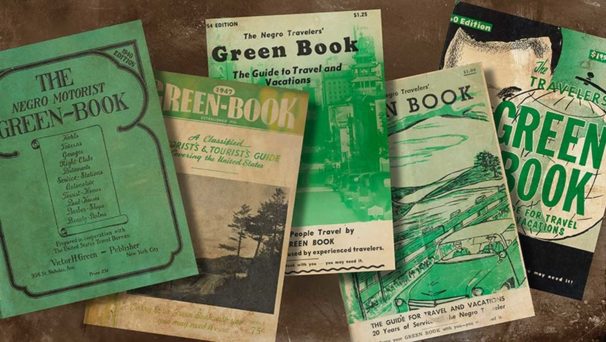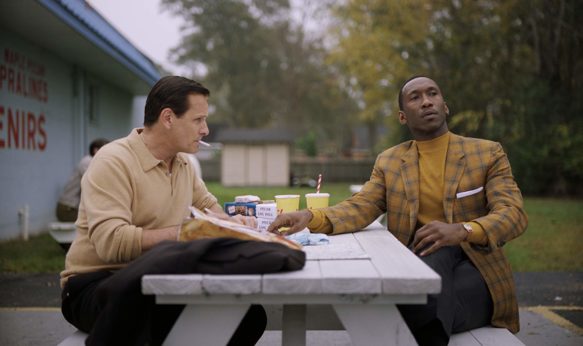
Just in time for the holiday (and Oscars) season is a feel-good movie dealing with two complete strangers who go on a journey together, both physically and emotionally, and eventually form a bond that would seemingly transcend class and color lines. The movie Green Book, which explores race relations and comradery, is being released at a time when “feel-good” isn’t exactly the best term to describe race and political conflict in America. Yet, the film provides some levity and a human interest narrative that viewers may appreciate, even as it falls short of digging deep into America’s layered and complicated past (and present) of race and systemic racism.
Directed by Peter Farrelly, the movie is based on the real-life story of the unlikely friendship between Jamaican classical pianist Donald Walbridge Shirley and New York bouncer Tony Vallelonga. The latter was Shirley’s chauffeur during a tour of the Deep South in the 1960s. They formed a close friendship while navigating the racism of the region.

The film stars Viggo Mortensen (The Lord of the Rings, The Road) as Tony and Mahershala Ali (House of Cards, Moonlight) as Donald. The name of the film references the book that Tony and Donald used to maneuver through the region in order to find restaurants, shops, and hotels that Donald, who was Black, could go to without facing racialized harassment.
This book, known as “The Negro Motorist Green-Book” or “The Negro Travelers’ Green Book,” came about during the Jim Crow era, when rigid race-based laws and segregation made it so Black people in the U.S. were legally denied access to facilities and services because of their skin color. The annual guidebook for African-American road trippers, created by New York City mailman Victor Hugo Green, listed services and places relatively friendly to African Americans. This helped Black travelers to avoid dangers and inconveniences along the road, from the refusal of food and lodging to police harassment. The book is a central prop piece in the film and serves as a symbolic reminder to the characters, and the audience, of the world Tony and Donald have to maneuver through.
Although the story is based on non-fiction, the general plot—strangers who eventually see past their differences to become friends—is not a new one. We’ve seen this story before. Two polar opposites get stuck together in some situation, they have a lot of conflict at first, then eventually some bonding moments. In the end, they learn some lessons from one another that ultimately make them better people. It’s been done before, and Green Book does this tried-and-true plot with an almost paint-by-numbers predictability. Yet, Mortensen and Ali’s chemistry and characters do the heavy lifting to give an enjoyable spin to this tale.
Mortensen plays the working-class Tony, a guy who knows how to talk, or punch, his way out of any situation. A former garbage truck driver, Tony works odd jobs while also being a club bouncer to make a living for his wife and children. Tony also happens to have his own prejudices against nonwhites (and almost anyone who isn’t Italian), as he casually drops racist remarks here and there in the beginning of the film.
Linda Edna Cardellini, as Tony’s wife Dolores, does a fine job in being his emotional support and moral compass, especially when it comes to racial tolerance. A lot of the film is from Tony’s perspective, and while this helps the viewer to watch the growth of that character, it also leaves less time to dig deep into perhaps the more intriguing character of Donald.
Ali plays someone who exists in a variety of intersectional spaces that come into conflict with one another. Donald is a world-renowned wealthy musician, yet he is relegated to being a second-class citizen in the United States. This wasn’t unheard of for many famous Black entertainers during the era. He’s invited to play and perform in front of high society, but he isn’t allowed to use the same bathroom as the white patrons.
He is Black, but at the same time he doesn’t fit the stereotypes of what Black is narrowed down to, and therefore he feels alienated from that community as well. Donald has inner turmoil that he’s constantly fighting. We get glimpses of this, and Ali does a wonderful job in those moments of showing those layers, but those moments never seem long enough. Other times, those moments are shown through Tony’s gaze, thus robbing the viewers of a more intimate understanding of Donald’s journey.
The scenes in which Mortensen and Ali play off each other are the best in the film, as the banter between the characters, and the delivery of the lines by the actors, entertainingly mix together. This is essential, as their relationship is the central focus of the movie, thus having to be something that the audience can not only believe but want to see succeed as well. That chemistry and dynamic of the characters are what to focus on here because the film falls short of providing anything other than predictable tropes and stereotypical scenes of hostile racial encounters when it comes to really addressing racism and oppression.

We get moments when Donald isn’t allowed into sections designated only for whites. There are other moments when police harassment comes into play and others where stereotypical hostile white people act a certain way towards Donald. These scenes seem to serve more as a way for the character of Tony to learn what Donald goes through, rather than exploring any bigger picture of how a system such as Jim Crow came to be.
Also, the racial incidents are individualized—some cops are bad, but some are good; some whites are ignorant, others less so. Such a portrayal lends itself to the notion that racism might be something to be fought against by changing individual minds, rather than by dealing with the real culprit—a system that is embedded with, and profiting from, the exploitation of people based on race. This is where the film falls short, but because it uses the hostility of the Deep South as more of a backdrop rather than a centerpiece, this shortcoming isn’t so glaring as to eclipse the better parts of the film.
An exposé of systemic racism and oppression this film is not. Then again, it doesn’t appear that it was trying to be. When the movie gives more focus to the human interest element of two individuals, Tony and Donald, trying to exist in a world that is imperfect just like they are, the performances shine and are great to watch. It’s an entertaining friendship dramedy that only scratches the surface of some deep-seated issues in the history of the United States. The viewer may not learn a great deal about this time in American history from the film, but they can enjoy the performances and positive story nonetheless.
Green Book opens in select theaters November 16, with a nationwide release on November 21.










